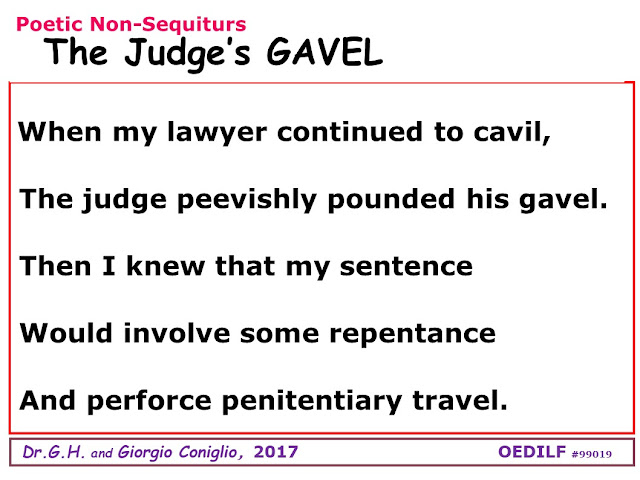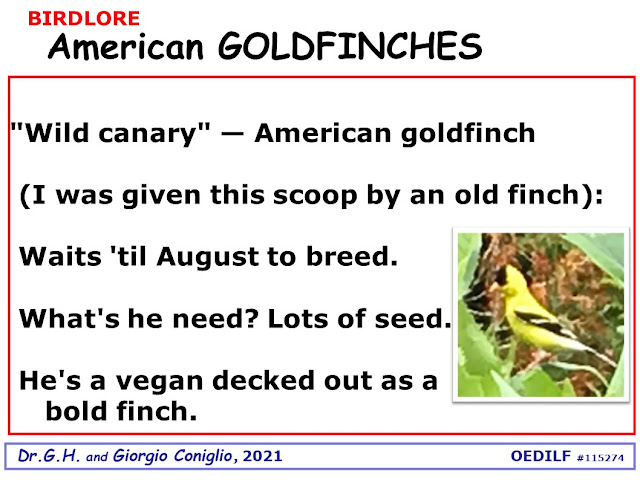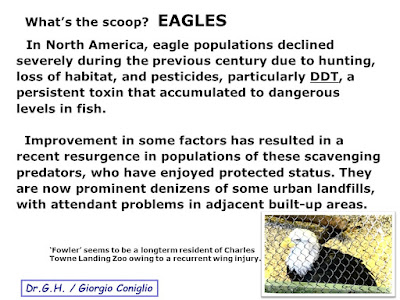Since 2016 Giorgio Coniglio, registered pseudonym and editor-in-chief, has been bundling collections of POETRY, WORDPLAY and PHOTOGRAPHY, seasoned with humour and parody, with the sole aim of entertaining YOU with presentations at the rate of 4 times per month. The related blog "DAILY ILLUSTRATED NONSENSE" sends out items from these collections in somewhat random order one-at-a-time.
Saturday, 20 August 2022
Monday, 15 August 2022
Survey Course: ENGLISH LITERATURE
CURRENT CONTENTS:
Pass/fail(getting by)
Pass/fail(getting by)
"Hamlet, Prince of Denmark"
"La Belle Dame Sans Merci"
"The Raven"
"Diary of Samuel Pepys"
"A Connecticut Yankee"
"Jabberwocky"
"Paradise Lost"
Authors' Note: During the author's stint as a university science major, a modicum of knowledge of the liberal arts was putatively assured by subjecting students to pass/fail survey courses. "Getting by", as in the above described English class, seemed to be the modus operandi of students, and occasionally of teaching staff.
Authors' Note:
bard: archaic term for a Celtic poet or wandering minstrel, currently applied primarily to the ‘Bard of Avon’, i.e. William Shakespeare
bodkin: a pointed instrument or pin, with archaic use to indicate a stiletto or other dagger
A question asked in Hamlet's most famous soliloquy is …
"Who would fardels bear?"
Fardel is derived from fardeau, the French word for “burden”.
Authors' Note:
rêverie (rehv-uh-REE): French for ‘dream, daydream’
grotesque: term adopted from French for an ancient Roman decorative artform rediscovered in Rome in the 15th century. Grotesques depict fantastical scenes and figures; the related adjective highlights the bizarre and even frightening nature of the images
grot: poetic variant of ‘grotto’
merci (mehr-SEE): French for mercy, forgiveness
The usual critical view is that the protagonist of the poem, transfixed by the 'faery's child', has been trapped and victimized. However, Keats' description in his poem written in 1819 (but taking place in a mythical medieval past), leaves little doubt that the 'Belle Dame' is underage. The societal view of what constitutes child molestation / statutory rape seems to have changed over time.
Authors' Note: Edgar Allan Poe wrote his best-known poem, "The Raven", in 1845. "The lost Lenore", and “quoth the Raven, ‘nevermore’ ” are famous phrases repeated in the poem.
An established classic, the poem will likely remain in the pantheon of poems ad infinitum (evermore).
Authors' Note: The concept for a classic literary satire began in 1884 when author Mark Twain (real name Samuel Clemens) read Le Morte d'Arthur (the Death of Arthur) by Sir Thomas Mallory, a classic romance about the knights of the Round Table.
In Twain’s fictional account, published 1889, action unfolds when Hank, a 19th century munitions-factory mechanic, awakens from a head injury to find himself amidst the sorcerers and knights at Camelot. As he rises to high rank in medieval society through manipulation of modern technology, he becomes known simply as "Boss".
Authors' Note: The noun-form of the adjective essential, used almost exclusively in the plural, exemplifies pluralia tantum, and indicates what is truly needed (Credentials, similarly, is an example of that grammatical curiosity).
Paradise Lost, the epic poem about the Fall of Man and the Garden of Eden, by 17th-century English poet John Milton (1608–1674). is contained in twelve books. Its review by young literature students is aided by student guides such as Cliff's Notes.
DIRECTION FOR WEB-TRAVELLERS:
To resume daily titillations on our related blog 'Daily Illustrated Nonsense', click HERE. Once you arrive, you can select your time frame of interest from the calendar-based listings in the righthand margin, and check the daily offerings for any month in the years 2020 to the present. (As of September 2023, there are over 1200 unique entries available on the Daily blog, and most of these are also presented here on 'Edifying Nonsense' in topic-based collections.) The 'Daily' format also has the advantage of including some videos and other material that are not shown here on this topic-based blog.
Wednesday, 10 August 2022
Poetic NON-SEQUITURS #2
previous poetic postings (#1)
almost kosher
almost kosher
bush plane
charity auction
close quarters
cumulative songs
demolition
dishwasher
doggy bag
CURRENT CONTENTS:
Epistaxis
ESL (W-I-P)
Far-flung family
Gavel (judge's)
Gifted children
Greetings (Spanish)
Ground down
Having the audacity
projected postings.
hoggishly...
(for continuation, see the link below)
Authors' Note:
peccadillo: loan-word from Spanish meaning 'little sin’
epistaxis (eh-pih-STAK-sihs): bleeding from the nostrils
These collections are arranged pretty much alphabetically. If you want to see the third instalment, click HERE.
DIRECTION FOR WEB-TRAVELLERS:
To resume daily titillations on our related blog "Daily Illustrated Nonsense", click HERE. Once you arrive, you can select your time frame of interest from the calendar-based listings in the righthand margin, and check the daily offerings for any month in the years 2020 to the present. (As of September 2023, there are over 1200 unique entries available on the Daily blog, and most of these are also presented here on "Edifying Nonsense" in topic-based collections.) The "Daily" format also has the advantage of including song-lyrics, videos and other material that are not shown here on this topic-based blog.
Friday, 5 August 2022
Poems about Avian Life: BIRDLORE, part#1
CURRENT CONTENTS:
American goldfinches
Birdfeeder (squirrel-proof)
Bird dropping
California scrub-jays
Cattle egrets
Cedar waxwings
Dawn chorus
De-snooding (domestic turkeys)
Eagles and eaglets
(for continuation, see the link below)
Authors' Note: This common North American bird species, Spinus tristis, is often referred to as the "wild canary" owing to the male's bright yellow summer coat, set off by black wings with white ribbons and black forehead patch. As their diet consists almost entirely of seeds, nesting does not begin until mid-or late summer when weed seeds become plentiful. Thistle heads are used not only to feed the young, but also to construct the nest! The relative dietary habits of finches around the globe (insects versus seeds) has been an area of intense biologic study (see the verse "Darwin's finches” at OEDILF.com).
The less intensely costumed female can be seen in a brief video on our daily blog HERE.
Authors' Note: Although its use appears cute, the term bird-turd displays your ignorance. The appropriate expression is pronounced as BEHRD drahp-ing in usual discussions.
Authors' Note: The cattle egret is a wading bird most closely related to the herons of Ardea species, but is also a cousin of the common egret and snowy egret. Unlike the latter birds, it may breed in drier areas further inland, and consume terrestrial insects as a substantial portion of its diet. Recently documented changes in its range include expansion to much of the United States, South America, southern Africa and Australia. In general, the bird's enlarged domain has followed that of domesticated grazing mammals.
As bovine may have the meaning of 'dull' or 'stolid', the author was delighted to ascribe more emotional responses to these beasts.
Authors' Note:
mohel (mo-HAYL, a more Hebraic pronunciation), or
moyel (MOY-uhl, more Yiddish-influenced)
The current verse can be read employing either pronunciation.
Bird-watchers, academic ornithologists, wordplay enthusiasts, wildlife photographers, Giorgio's relatives, and just everyday folks have united in their demand for more verses on the topic of landbirds!
So, please follow this link! for 'birdlore, part#2'
GENERAL DIRECTIONS FOR WEB-EXPLORERS:
To resume the sequence of daily titillations on our related blog "Daily Illustrated Nonsense", click HERE. Once you arrive, you can select your time frame of interest from the calendar-based listings at the bottom of the page, and check the daily offerings for any month from the start of 2020 until December 2024.
As of December 2024, there are 1800 unique entries available on the daily blog, displaying individual poems (often illustrated) and wordplay, but also with some photo-collages and parody song-lyrics. Most of their key elements are also presented here on "Edifying Nonsense" in topic-based collections, such as this one. The "Daily" format also has the advantage of including some song-lyrics, videos and other material that are not shown here on this topic-based blog.
Subscribe to:
Posts (Atom)






























